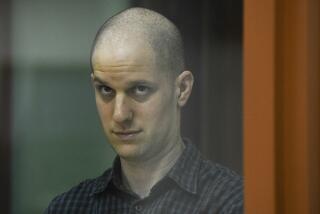Shultz Refuses to Link Summit and Daniloff
- Share via
WASHINGTON — The Reagan Administration will not allow the continuing dispute over Soviet spy charges against an American newsman to interfere with preparations for a planned summit between President Reagan and Soviet leader Mikhail S. Gorbachev, Secretary of State George P. Shultz said Tuesday.
“We have to handle something like a spying activity on their part and taking a hostage as (reporter Nicholas) Daniloff on its own merits . . . independent of what effect it may or may not have on something like the summit,” Shultz told constituents of Rep. Ralph Regula (R-Ohio) during a meeting at the Capitol.
Shultz pledged to put the espionage case of Daniloff, a U.S. News & World Report correspondent in Moscow, at the top of the agenda when he meets here Friday and Saturday with Soviet Foreign Minister Eduard A. Shevardnadze to discuss summit preparations.
‘Will Be Shoes Dropped’
But the secretary also seemed to edge away from the hard line he had hinted at earlier in the day, when he told a Senate Judiciary subcommittee on immigration that “there will be shoes dropped as we go along” if Daniloff is not allowed to leave the Soviet Union. He did not elaborate on his comments before the panel.
Shultz insisted that the summit planning and the Daniloff situation are not linked. “That’s another issue,” he said of efforts to win the reporter’s freedom, and “we are not going to be guided by that.”
At the State Department, an official who spoke on condition of anonymity said that “intense” high-level negotiations between the two countries to resolve the Daniloff situation are under way and cautioned reporters not to be swayed by the rhetoric of officials.
“Don’t rush to judgment as to what is happening on the back channel on the basis of what is being said in public for public consumption,” the official warned. “Both sides are engaged on the real issues.”
Although he described the secret negotiations as “hard bargaining,” the official said, “We don’t see a total impasse.”
In Moscow, Soviet officials appeared eager to resolve the Daniloff case.
“We would be happy not to have this case,” Boris D. Pyadyshev, deputy director of the Foreign Ministry’s information department, told reporters at a briefing.
Relations at ‘Low-Level’
“Soviet-American relations are at a rather low level even without this case,” Pyadyshev said. “We would be happy to have this case solved as soon as possible.”
Pyadyshev referred to the case as an “insignificant matter” that should not block progress in the Shultz-Shevardnadze talks.
Pyadyshev made no mention of Gennady F. Zakharov, the Soviet physicist arrested Aug. 23 in New York on spy charges. Other Soviet officials have hinted that they would be willing to exchange Daniloff for Zakharov, although President Reagan has said that such an exchange would be unacceptable on grounds that Daniloff is innocent while Zakharov was caught in an act of espionage.
Meanwhile in New York, Zakharov met with reporters for the first time since he was apprehended on a Queens subway platform.
Zakharov, a 39-year-old physicist employed by the United Nations, denied any connection between his arrest and the jailing seven days later of Daniloff and insisted that he was “set up” by American authorities trying to undermine U.S.-Soviet relations.
No Diplomatic Immunity
The physicist, who lacks diplomatic immunity, was charged with paying $1,000 to buy U.S. military secrets from a student working undercover for the FBI.
Daniloff was arrested a week later in a Moscow park after accepting a package from a Soviet citizen. He said he believed that it contained newspaper clippings, but Soviet officials contended that it included pictures of Soviet military installations. Like Zakharov, Daniloff insisted that he was set up.
Although Administration officials declared that the cases should not be linked, they agreed last Friday to a deal in which Daniloff and Zakharov were released from jail to the custody of their respective ambassadors. Both men remain under indictment, however, and neither is free to return to his homeland.
Zakharov, speaking to reporters at the Soviet U.N. Mission, laid his arrest to an “atmosphere of spy mania” among U.S. officials opposed to a Reagan-Gorbachev summit.
Times staff writers Doyle McManus, in Washington, and William J. Eaton, in Moscow, contributed to this story.
More to Read
Sign up for Essential California
The most important California stories and recommendations in your inbox every morning.
You may occasionally receive promotional content from the Los Angeles Times.












